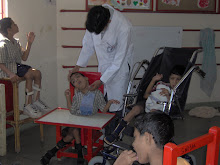Dr Sharat Chandra Pani
What is the role of the dental hygienist in Special Care dentistry? When we think of special needs dentistry, most of us assume that it is the domain of a specialist. Most eager graduate students think of a glamorous, niche specialty that is for people who are not only aware but also proficient in the knowledge of medical, physical and/or developmental disorders. It is no wonder that most dentists would raise an eyebrow if you were to discuss the role of the dental hygienist in special care dentistry. DCSN looks at 5 reasons at how the dental hygienist can prove to be a valuable asset in Special Needs Dentistry
Reason 1 - Why not?
The first thing people throw at your face is they are not qualified. I disagree. Special needs dentistry in most parts of the world is carried out (sometimes reluctantly) by general practitioners. Surely an eager dental hygienist with the required BLS training can do as good a job as a dentist who may feel she is losing out on more lucrative patients.
Reason 2 - Prevention is their Forte
The average dental hygienist takes as many if not more credit hours of preventive courses in course of her training. Preventive procedures make up the backbone of good dental care for special needs individuals. You don't really need a specialist with a double masters or a PhD to remove dental plaque or to make sure preventive regimen are being followed
Reason 3- Expand the base of the workforce
Many if not most general practitioners prefer not to treat patients with special needs, referring them to a specialist after the initial examination and preventive treatment. A dental hygienist will not only be able to do this job but perhaps do it better.
Reason 4 - Expand the reach of Special Needs Dentistry
Currently special needs dentistry in most parts of the world is non existent as a specialization or concentrated in referral centers in urban areas. The most important need for special needs dentistry is to reach out to areas and people who do not have the benefit of such care. The effective use of dental hygienists as a part of Domiciliary Dentistry teams not only increases the manpower but also expands the reach of the workforce to rural and semi-urban areas.
Reason 5 - They are part of the Team
Special Needs Dentistry requires a team, and while most people would be all eager to acknowledge the role of the physician or even the nurse many may feel that dental hygienists just don't measure up, or that they are not needed. Face the facts - dental hygienists are not only more comfortable rendering preventive procedures but they are also probably better at it. Studies have shown that when it comes to the placement of fissure sealants dental hygienists do as good a job as specialists. If you feel that oral prophylaxis and placement of sealants in healthy individuals is the job of the dental hygienist why should special needs dentistry be different.
Dental hygienists will require the same level of Basic Life Support (BLS) training as a special care dentists and they will require orientation programs to better acquaint them with stabilization techniques. But make no mistake a well trained dental hygienist is an asset in the dental office and invaluable in community program.






